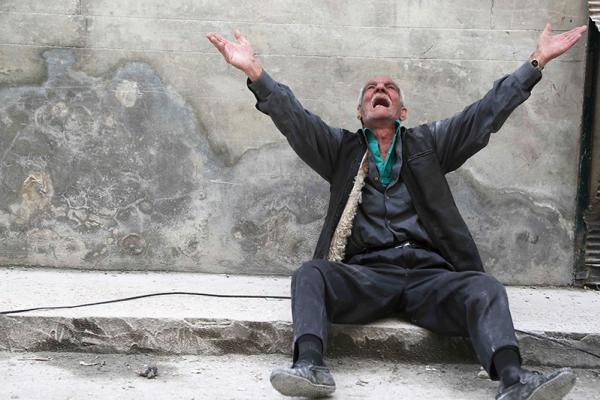Ultimately, Jesus shows us that our wounds do more than mark us — they connect us. Jesus knows that through the touching of his wounds, Thomas will be forever connected to him, doubts and all. Jesus knows that we must let our scars speak. In this beautiful, intimate encounter with Thomas, Jesus teaches us to let our wounds show and be touched so we too can know peace. Peace cannot come to us until we have the courage to proudly bare our scars and connect with one another through our wounds. Until then, we, like Thomas, will be left standing in our doubts and anxieties.
I will not pretend to fully understand the complex circumstances surrounding the death of Freddie Gray and the riots in Baltimore. But I have to wonder what would happen if we followed Jesus’ instructions to Thomas. What if instead of ignoring bystanders’ cries for Freddie Gray to receive medical treatment, the police had reached out their hands and held an inhaler for Freddie Gray? What if all the people of Baltimore had put their hands on Freddie Gray’s injured spine? What if the police force in Baltimore had reached out for the wounds of grief deeply gnawing within the rioting crowds? What if the crowds had placed their hands into the wounds of the injured police officers?
Hundreds gathered at Gallery Place Metro in Washington, D.C., on Wednesday night in solidarity with Baltimore activists to protest the death of Freddie Gray. The crowd marched for two hours across the city until reaching their final destination at the White House.
Leaders from multiple activist groups were helping lead the crowd, including Eugene Puryear, a candidate for the At-Large seat in the D.C. Council. The crowd began the march with chants of, "All night, all day, we're going to fight for Freddie Gray!" More solidarity events have been planned by the event organizers in the upcoming days.
Perhaps we are here again because we do not really listen. We gaze at each other’s pain and lament, but we don’t really see in a way that will shift our vision, clarify our perspective. We hear each other’s stories but don’t really listen in a way that will change us in a profound way, lead us to question our deepest held assumptions. We post a hashtag but don’t embody these digital signatures in our everyday lives?
Randy Berry, 50, is the U.S. special envoy for the human rights of lesbians, gay men, bisexuals, and transgender people, the first such post ever created by a nation, according to the State Department.
In that trailblazing role, he said, he has an opportunity to help his two children grow up in a world more accepting than the one he was born into.
As someone who has “walked the personal journey of coming out,” Berry said, he knows how crucial positive messages and support are to a U.S. and global LGBT community plagued by young suicides.
Kenyan law bans homosexuality, and many clergy regularly preach against it as sin before God. But the ruling means that LGBT Kenyans will have an official platform from which to fight for their rights and freedoms.
“This is what we have been crying for,” said the Rev. Michael Kimindu, a former Anglican priest and now president of Other Sheep-Africa, a gay rights organization.
“It is the beginning of the journey towards freedom. We will now start asking: What happens when two people who are gay want to have a baby or want to go to church to marry?”
Top officials from the Vatican, the head of the United Nations, and leading scientists came together at a summit April 28 in Vatican City to label the fight against man-made climate change as a “moral issue.”
“Mitigating climate change and adapting to its effects are necessary to eradicate extreme poverty, reduce inequality, and secure equitable, sustainable economic development,” said Ban Ki Moon, U.N. secretary-general, in the keynote speech.
“It is a moral issue. It is an issue of social justice, human rights, and fundamental ethics,” the secretary-general said, adding that “climate change is the defining issue of our time.”
Just a few decades ago, Aleppo was home to about 170,000 Catholics, about a third of the city’s population. Since the war broke out, Jeanbart has seen a third of his flock reduced by death, dislocation, and emigration while Aleppo’s Muslim population has soared.
The threat of annihilation is constant, as Aleppo has become the main battleground between the government forces of President Bashar Assad and a motley assortment of rebels who include growing numbers of fighters affiliated with the fundamentalist terrorism of the Islamic State group.
A cake shop has been in the news lately. Sweet Cakes in Oregon made national headlines when a same-sex couple levied a lawsuit against it for refusal of service.
This is where the story gets interesting.
In the state of Oregon, same-sex marriages are legal. The couple went to the cake shop to order a wedding cake for their upcoming union. The cake shop said no on the ground of their religious beliefs — or as they put it, "standing on the word of God."
This sparked raging debates on whether a business has the legal right to discriminate solely based on their religious beliefs. Investigations have been held, feelings have been hurt, Scripture has been quoted and misquoted, and Facebook rants have been posted.
Franklin Graham has now added his two cents, starting an online donation campaign to help with the bakery’s looming legal fines — its actions violated the Oregon Equality Act of 2007, which states that persons cannot be denied service based on their sexual orientation.
In Graham's plea he stated that the shop owners were being "persecuted" for their religious beliefs. But this is not called persecution — this is called being held to a standard of decency, tolerance, and love. These are tenants Christ wanted his followers to imitate.
Most Christians would throw a fit if a bakery, store, or other business denied them service because of the owner’s religious beliefs. There would be lawyers on the phone, news crews outside the establishment, and more Facebook rants about how our society is slowing losing its “Christian heritage.”
Isn’t interesting that some Christians are ok with denial of service to this same-sex couple in the name of business/religious liberty, but wouldn’t want to the tables to be turned on them?
Just because 78 percent of Americans identify as Christian does not mean we all see eye to eye. But is Christianity truly “persecuted” if it comprises more than three out of every four people in a society?
What people are mad about is that their version of Christianity is not the norm or the most accepted one anymore. Many Christians see same-sex marriage as a nonissue. Many church denominations have had intense and productive conversations about homosexuality in the church. Some are still divided. Many people, churches, and denominations need to hold more conversations, prayer, and discernment. The United States and the Church have a long way to go until full equality is achieved.
The issue with regards to this bakery is not their religious liberty, Christian persecution, or even the right to practice one’s faith. It is the notion that discrimination is wrong.
In this war of words many are not seeing the real issue, which is this — discrimination, even under the guise of religion, is still discrimination, and it is against the most basic and fundamental teachings of Jesus Christ.
On the heels of what seemed like its greatest triumph — a magnificent display of sculptures by the Renaissance pioneer Donatello — a small but important museum in midtown Manhattan, that specialized in religious art regarded with a neutrally secular eye, announced April 28 that it was going out of business.
A press release from the Museum of Biblical Art, known as MOBIA, explained that after learning in February that the American Bible Society, which had housed it for a decade, was selling its building and moving to Philadelphia, the museum explored multiple options but could not raise the funds needed to keep going at a new location.
The museum will close to the general public on June 14 and cease operations on the 30th, although an exhibit it co-organized on Spanish colonial religious art will open in Palm Beach, Fla., in March next year.
MOBIA’s fate was not a total surprise; The Bible Society, once MOBIA’s sole funder, had been ramping down its support by mutual agreement, and the sale of the building had been rumored since 2012. But the closing nonetheless deeply rattled the museum staff and those who treasured MOBIA as one of the few museums in the country that routinely acknowledged art’s religious context.
“I’m stunned,” said Dale T. Irvin, president of the New York Theological Seminary, who sometimes brought classes to MOBIA to see cross-cultural study of Scripture illustrated.
“I can’t believe that it’s slipping away. It was such a valuable resource.”
In one minute, the April 25 earthquake in Nepal toppled, destroyed,and damaged a millennium of religious history. What religious buildings were damaged, and which ones are gone? What religious significance did these buildings have and to whom? Will they be rebuilt? Can they be? Let us explain …
Q: What religions do the Nepalese people follow?
A: About 80 percent of Nepalese are Hindu, making it the second-largest Hindu nation outside of India, with about 2 percent of the global total. But the small, mountainous country is also the birthplace of the Buddha and home to Muslims and Christians, too.
Q: What religious sites are in Nepal and who are they sacred to?
A. The most important religious site in Nepal is Lumbini, west of Kathmandu, just outside the Indian border. Lumbini is sometimes called the “Buddhist Bethlehem” because it is the birthplace of Siddhartha Gautama, the Indian nobleman who became the Buddha, in 623 B.C.
Siddhartha’s mother, Queen Maya Devi, is said to have given birth on the site now marked by Lumbini’s Mayadevi Temple and to have bathed her infant son in its adjacent pool. The ancient part of the site — there are many new temples and monasteries surrounding it — also includes a sacred Bodhi tree, the same type of tree the Buddha is said to have sat under when he attained enlightenment. Archaeologists have found evidence of worshippers at this site as early as 1000 B.C., perhaps members of a pre-Buddhist tree-worshipping sect. The extent of the damage at Lumbini is not yet known because of the difficulty of getting in and out of the area.









